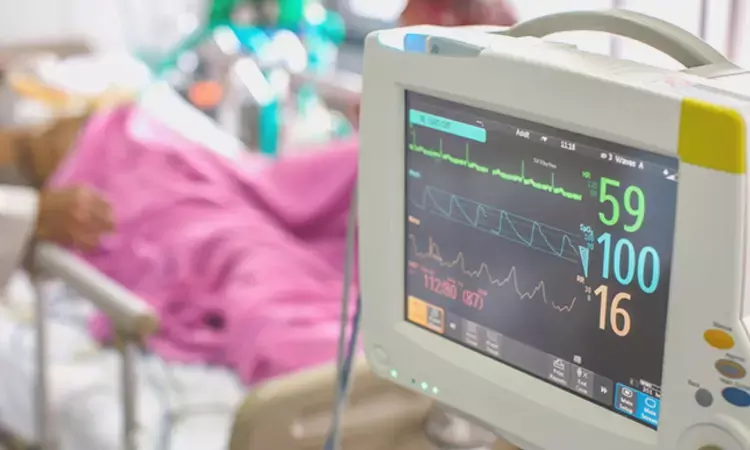- Home
- Medical news & Guidelines
- Anesthesiology
- Cardiology and CTVS
- Critical Care
- Dentistry
- Dermatology
- Diabetes and Endocrinology
- ENT
- Gastroenterology
- Medicine
- Nephrology
- Neurology
- Obstretics-Gynaecology
- Oncology
- Ophthalmology
- Orthopaedics
- Pediatrics-Neonatology
- Psychiatry
- Pulmonology
- Radiology
- Surgery
- Urology
- Laboratory Medicine
- Diet
- Nursing
- Paramedical
- Physiotherapy
- Health news
- Fact Check
- Bone Health Fact Check
- Brain Health Fact Check
- Cancer Related Fact Check
- Child Care Fact Check
- Dental and oral health fact check
- Diabetes and metabolic health fact check
- Diet and Nutrition Fact Check
- Eye and ENT Care Fact Check
- Fitness fact check
- Gut health fact check
- Heart health fact check
- Kidney health fact check
- Medical education fact check
- Men's health fact check
- Respiratory fact check
- Skin and hair care fact check
- Vaccine and Immunization fact check
- Women's health fact check
- AYUSH
- State News
- Andaman and Nicobar Islands
- Andhra Pradesh
- Arunachal Pradesh
- Assam
- Bihar
- Chandigarh
- Chattisgarh
- Dadra and Nagar Haveli
- Daman and Diu
- Delhi
- Goa
- Gujarat
- Haryana
- Himachal Pradesh
- Jammu & Kashmir
- Jharkhand
- Karnataka
- Kerala
- Ladakh
- Lakshadweep
- Madhya Pradesh
- Maharashtra
- Manipur
- Meghalaya
- Mizoram
- Nagaland
- Odisha
- Puducherry
- Punjab
- Rajasthan
- Sikkim
- Tamil Nadu
- Telangana
- Tripura
- Uttar Pradesh
- Uttrakhand
- West Bengal
- Medical Education
- Industry
Vancomycin and meropenem or vancomycin and cefepime reduce nephrotoxicity risk in ICU patients: Study

USA: Findings from a retrospective cohort study suggest that clinicians should consider meropenem and vancomycin or cefepime and vancomycin to reduce nephrotoxicity risk for ICU (intensive care unit) patients.
The study, published in the CHEST journal, revealed that vancomycin and piperacillin-tazobactam (VPT) are associated with a higher risk of acute kidney injury than both vancomycin and meropenem and vancomycin and cefepime in ICU patients, particularly for patients with normal initial kidney function requiring longer durations of therapy.
There was a need for the study given the conflicting evidence regarding acute kidney injury associated with concomitant administration of vancomycin and piperacillin-tazobactam, particularly in patients in the ICU. Therefore, Alyssa Y. Chen, The University of Texas Southwestern Medical School, Dallas, TX, and colleagues aimed to determine if the difference exists in the association between commonly prescribed empiric antibiotics on ICU admission (vancomycin and piperacillin-tazobactam, vancomycin and meropenem, and vancomycin and cefepime) and acute kidney injury.
For this purpose, the researchers conducted a retrospective cohort study by utilizing data from the eICU Research Institute containing records for ICU stays between 2010 and 2015 across 335 hospitals. Enrollment of the patients was done if they received vancomycin and cefepime, vancomycin and piperacillin-tazobactam, or vancomycin and meropenem exclusively. Patients initially admitted to the emergency department (ED) were included. Patients receiving dialysis, with a hospital stay duration of < 1 h, or with missing data were excluded.
Acute kidney injury was defined as Kidney Disease: Improving Global Outcomes stage 2 or 3 based on serum creatinine component. Patients in the control vancomycin and meropenem or vancomycin and cefepime) and treatment (vancomycin and piperacillin-tazobactam) groups were matched using propensity score matching, and ORs were calculated. The effect of longer courses of combination therapy and patients with renal insufficiency on admission was studied by performing sensitivity analyses.
The inclusion criteria were met by thirty-five thousand six hundred fifty-four patients (vancomycin and cefepime, n = 6,371; vancomycin and piperacillin-tazobactam, n = 27,459; vancomycin and meropenem, n = 1,824).
The researchers reported the following findings:
· Vancomycin and piperacillin-tazobactam were associated with a higher risk of acute kidney injury and dialysis initiation when compared with that of both vancomycin and cefepime (Acute kidney injury: OR, 1.37; dialysis: OR, 1.28) and vancomycin and meropenem (Acute kidney injury: OR, 1.27; dialysis: OR, 1.56).
· The odds of acute kidney injury developing were especially pronounced in patients without renal insufficiency receiving a longer duration of vancomycin and piperacillin-tazobactam therapy compared with vancomycin and meropenem therapy.
"Clinicians should consider vancomycin and cefepime or vancomycin and meropenem to reduce the risk of nephrotoxicity for patients in the ICU," the researchers concluded.
Reference:
Chen AY, Deng CY, Calvachi-Prieto P, Armengol de la Hoz MÁ, Khazi-Syed A, Chen C, Scurlock C, Becker CD, Johnson AEW, Celi LA, Dagan A. A Large-Scale Multicenter Retrospective Study on Nephrotoxicity Associated With Empiric Broad-Spectrum Antibiotics in Critically Ill Patients. Chest. 2023 Aug;164(2):355-368. doi: 10.1016/j.chest.2023.03.046. Epub 2023 Apr 9. PMID: 37040818.
Dr Kamal Kant Kohli-MBBS, DTCD- a chest specialist with more than 30 years of practice and a flair for writing clinical articles, Dr Kamal Kant Kohli joined Medical Dialogues as a Chief Editor of Medical News. Besides writing articles, as an editor, he proofreads and verifies all the medical content published on Medical Dialogues including those coming from journals, studies,medical conferences,guidelines etc. Email: drkohli@medicaldialogues.in. Contact no. 011-43720751
Next Story


